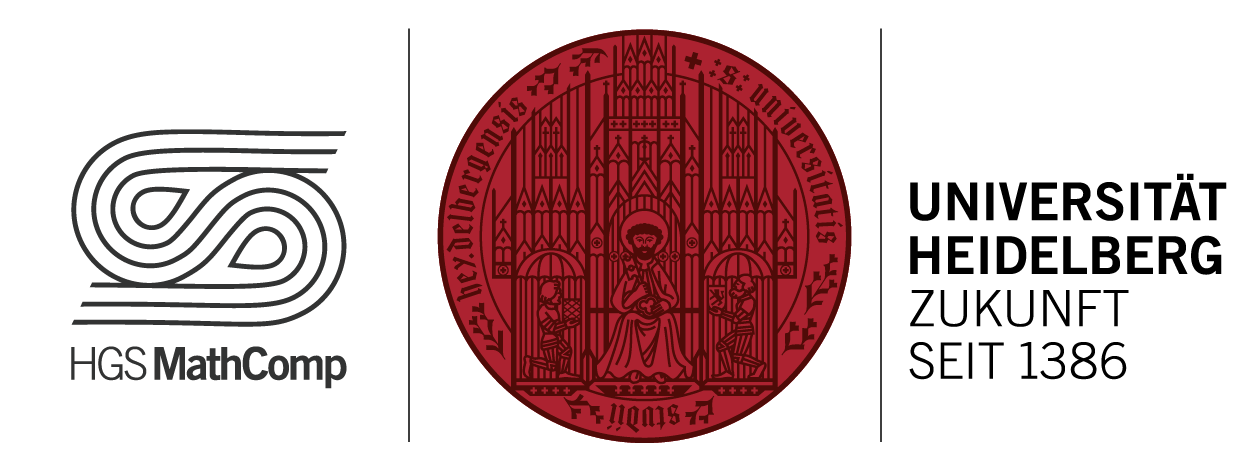HGS MathComp - Where Methods Meet Applications
The Heidelberg Graduate School of Mathematical and Computational Methods for the Sciences (HGS MathComp) at Heidelberg University is one of the leading graduate schools in Germany focusing on the complex topic of Scientific Computing. Located in a vibrant research environment, the school offers a structured interdisciplinary education for PhD students. The program supports students in pursuing innovative PhD projects with a strong application-oriented focus, ranging from mathematics, computer science, bio/life-sciences, physics, and chemical engineering sciences to cultural heritage. A strong focus is put on the mathematical and computational foundations: the theoretical underpinnings and computational abstraction and conception.
HGS MathComp Principal Investigators are leading experts in their fields, working on projects that combine mathematical and computational methodology with topical research issues. Individual mentoring for PhD candidates and career development programs ensure that graduates are fully equipped to take up top positions in industry and academia.
18:00
Registration: Registrierung über die Event-Website
Organizer: hei_INNOVATION • Institut für Informatik • IWR • GI Fachgruppe Frauen und Informatik
Du studierst in Heidelberg und fragst dich, ob eine Karriere in der IT etwas für dich sein könnte – auch ohne Informatik-Background? Dann haben wir genau das Richtige für dich! Nach zwei erfolgreichen Runden laden wir dich herzlich zur Neuauflage unseres beliebten IT-Panels speziell für Studentinnen ein.
Dieses Event richtet sich an alle Studentinnen der Universität Heidelberg. Egal, ob du aus einem IT-nahen Fach kommst oder als Quereinsteigerin aus den Geistes-, Sozial- oder Naturwissenschaften neugierig auf die Tech-Welt bist: Deine Perspektive ist gefragt!
• Spannende Einblicke: In einer interaktiven Panel-Diskussion beleuchten wir die vielfältigen Tätigkeitsfelder in der Informatik – weit über das reine Programmieren hinaus.
• Networking in lockerer Atmosphäre: Komm bei Häppchen und Getränken direkt mit den Expertinnen und anderen Studentinnen ins Gespräch, knüpfe wertvolle Kontakte und stelle all deine Fragen.
09:00 - 13:00
Location: Mathematikon • Im Neuenheimer Feld 205, 69120 Heidelberg
Registration: Please register on the course website
Organizer: Scientific Software Center (SSC)
The latest information and a registration link are available on the course website.
This compact course is part of the course program of the Scientific Software Center (SSC) at Heidelberg University.
Prior knowledge about version control with Git is required. This can e.g. be acquired by attending the SSC’s introductory course “Version Control with Git” and “Intermediate Topics in Version Control with Git”. This course is intended for researchers that develop their own research software. Participants are required to bring their own laptops to work on during the course. Network access (e.g. through Eduroam) is recommended.
Summary:
Applying version control can be a game changer for a collaborative research software project. However, even in projects that already successfully use Git, there is often room for improvement of the employed Git workflows. This workshop explores some advanced topics that increase the participants’ repertoire of Git workflows: Bisection, Worktrees, Submodules, Large File Storage and Pre-commit Hooks. Additionally, we showcase invasive methods of modifying a Git repository via Rebase.
Learning Objectives:
After the course participants will
- Know about advanced Git features like submodules, large file storage
- Be able to bisect regression in a Git repository
- Understand the advantages of worktrees
- Be able to apply pre-commit hooks for their Git repositories
- Have used Rebase to change a repository’s Git history
14:00 - 18:00
Location: In-Person in Heidelberg
Registration: Please register on the event website
Organizer: Graduate Academy
The latest information and a registration link are available on the course website (log in with Uni-ID).
HGS MathComp fellows can get a reimbursement of the course fees. Please submit your proof of payment and certificate of participation to hgs@iwr.uni-heidelberg.de.
In particular, the course will cover the following topics:
- Requirements on research data handling from universities, research funders and scientific journals
- Short-term and long-term preservation: formats, metadata, documentation, standards
- Open Research data, data publication and data citations: Where? How? Why and why not?
- Creation of data management plans for research projects


